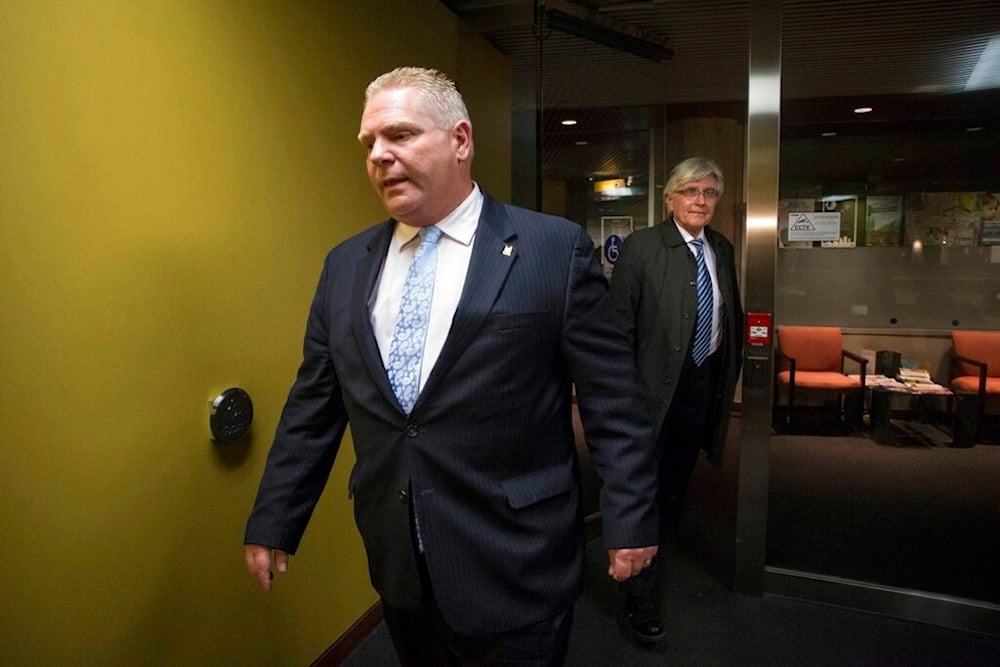Canada official warns of energy supply cut to US over Trump tariff row
Ontario Premier Doug Ford reveals that Canadian officials have prepared a list of US exports that could be subject to retaliatory tariffs.
-

Toronto City Councillor Doug Ford walks out of his office with City Manager Joe Panachetti after Toronto councillors had voted to limit the power of Mayor Rob Ford, on Monday, November 18, 2013 (THE CANADIAN PRESS)
Canadian officials have issued warnings about the possibility of cutting off energy supplies to the United States if President-elect Donald Trump's incoming administration follows through on its threat to impose 25% tariffs on imports from Canada.
Ontario Premier Doug Ford stated on Wednesday, after a meeting of provincial premiers, "We will go to the extent of cutting off their energy — going down to Michigan, going down to New York State and over to Wisconsin."
"I don’t want this to happen, but my number one job is to protect Ontarians and Canadians as a whole," he added. "We need to be ready to fight."
Ford also revealed that Canadian officials have prepared a list of US exports that could be subject to retaliatory tariffs.
According to the US Energy Information Administration, Canada was the largest supplier of petroleum imports to the US in 2023, with 97% of Canadian crude oil exports destined for the US.
Trump told Trudeau Canada should become 51st US state amid tariffs row
In a social media post on Tuesday, Trump referred to Canadian Prime Minister Justin Trudeau as the "Governor" of the "Great State of Canada," sparking controversy as tensions between the two leaders escalate over trade and tariffs.
"It was a pleasure to have dinner the other night with Governor Justin Trudeau of the Great State of Canada. I look forward to seeing the Governor again soon so that we may continue our in depth talks on Tariffs and Trade, the results of which will be truly spectacular for all!" Trump said on Truth Social.
Last month, Trump threatened to impose tariffs on key US trading partners, including Canada, Mexico, and China, as part of an effort to curb illegal immigration and the drug trade.
Under the provisions of the United States-Mexico-Canada Agreement (USMCA), formerly known as NAFTA, numerous goods are traded duty-free among the three nations, provided they comply with rules of origin and other established standards.
However, Trump’s proposal would breach the agreement, potentially jeopardizing economic and political relations among the countries in the region.
Trudeau traveled to Mar-a-Lago shortly after the tariff threat for a meeting with Trump. However, the President-elect has made several provocative remarks about Canada since the announcement.
Trump suggested to Trudeau that if tariffs meant to address trade and immigration issues would devastate Canada’s economy, perhaps the country should consider becoming the 51st US state, Fox News reported, citing sources.
Details of the meeting, which Trump described as "very productive", have begun to emerge. Prior to a dinner, the discussion centered on tariffs, border security, and trade deficits.
According to two sources who attended the dinner, Trump, while cordial, directly criticized Canada’s handling of border security and trade. He accused the country of failing to prevent the influx of illegal drugs and migrants, including individuals from over 70 countries, across the US border.
He also claimed the US trade deficit with Canada exceeds $100 billion, a figure he emphasized during the discussion.
Trump reportedly warned Trudeau that if these issues were not addressed, he would impose a 25% tariff on Canadian goods on his first day back in office, to which the Canadian premier responded by stating that such a tariff would devastate the Canadian economy.
In response, Trump allegedly asked whether Canada’s survival depended on what he characterized as "ripping off" the US to the tune of $100 billion.
The sources claim Trump then suggested that Canada should consider becoming the 51st US state, which drew nervous laughter from Trudeau and others at the table.
Trump went on to remark that while "prime minister" is a prestigious title, Trudeau could still serve as governor of a new US state.
Meanwhile, the Bank of Canada has highlighted Trump’s tariff threats as a “major source of new uncertainty” for the Canadian economy.
In a bid to prevent the proposed tariffs, Canada is reportedly planning to deploy drones and police dogs along the US-Canada border to address Trump’s concerns over immigration and drug smuggling.
Read more: Canada-US-Mexico treaty allows region to compete with China: Mexico

 4 Min Read
4 Min Read








